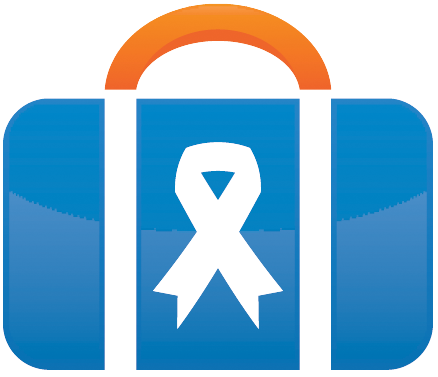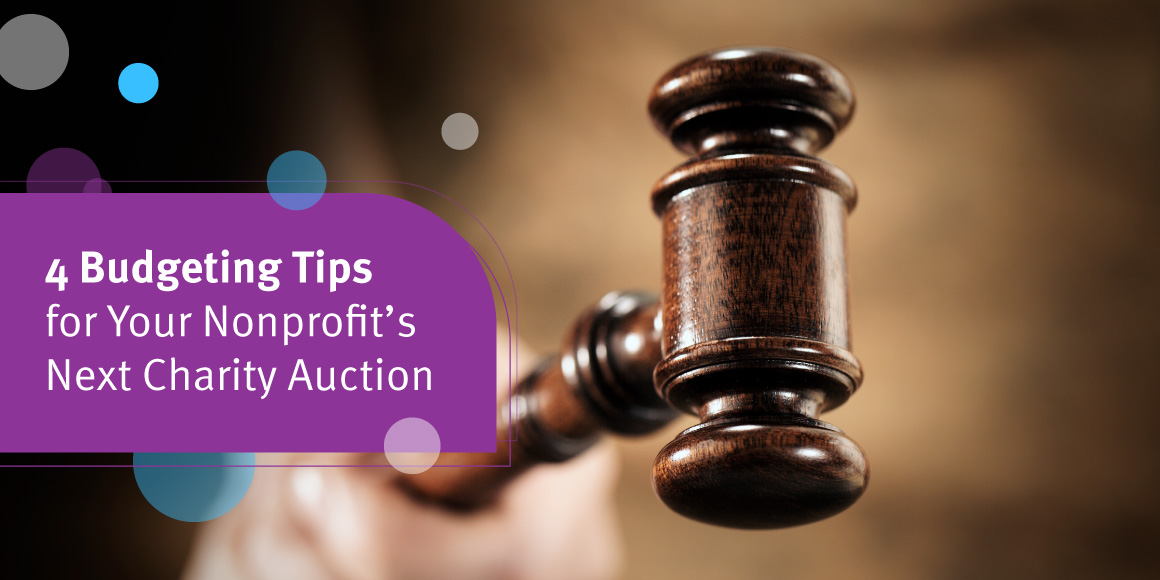When it comes to budgeting for your organization’s various campaigns, one primary goal is consistent across all of them: for the earnings to exceed the expenses. The same rule applies to planning your nonprofit’s next charity auction.
Planning a major event that will make up its return on investment takes time. Your nonprofit will need to gain a positive reputation in the community, set the right KPIs, and refine your techniques to maximize your earning potential.
It all starts with your budget. An effective budget will lay out your organization’s expected expenses as well as your anticipated revenue for your next charity auction. Plus, having a clear budget that you stick to can minimize risk, ensure you have a transparent spending record, and establish expectations for your entire team.
In this guide, we’ll dive deeper into the budgeting process when creating a budget for a charity auction. We’ll cover the following tips:
- Set your budgetary timeframe.
- Consider your potential income and goals.
- Determine your predicted expenses.
- Communicate tax implications for donors’ budgets.
Maintaining a mindset of growth and maximizing your organization’s next campaign requires careful and accurate planning. With more time and practice, you’ll refine your strategies, work with additional data, and create better budgets to guide your campaigns. Let’s get started.
1. Set your budgetary timeframe.
One of the key elements of a budget is that it covers a finite period of time, which means you’ll need to determine when your charity auction will take place. Create a timeline that covers the duration of item procurement, event promotion, execution, and follow-up.
This timeline should highlight the budgetary estimates for each part of the campaign and set check-in points for your team to review your finances.
Be conscious that the type of auction you host can heavily influence your timeframe. For instance, consider the timelines for the following types of auctions:
- Live auctions with an auctioneer promoting items will likely only take a few hours, but they might need additional marketing and promotion time to encourage people to attend.
- Silent auctions held in person will likely last longer than live auctions because they provide additional mingling opportunities for your attendees, keeping them entertained and giving them more time to browse your entire catalog of prizes.
- Hybrid auctions will typically require more time for the online portion of the auction. When planning a hybrid fundraising auction, open online bids before your in-person event starts or keep them open afterward. Doing so will give guests more time to bid, whether they attended virtually or in person.
- Online auctions can be open for days, allowing supporters to browse items and place bids at their leisure. Be sure to advertise when the auction closes, and consider using a countdown timer to create a sense of urgency for last-minute bids.
Your timeline will also depend on the number of attendees, as larger events often require more time to promote and then follow up with attendees afterward.
While this is not necessarily true for all events, the longer you plan to devote to each part of your event, the more expensive it becomes. A longer marketing phase means you’ll need to share more promotional materials, resulting in additional expenses. The longer the event itself, the more activities you’ll need to include to engage supporters.
2. Consider your potential income and goals.
When people think of budgets, they often focus on the expenses they anticipate incurring throughout the given time frame and forget to account for the revenue they’ll receive.
Be sure to put just as much thought and detail into your anticipated revenue as your expenses. When you consider the potential income of your organization’s charity auction, you should consider all sources of revenue, including but not limited to:
- Ticketing. Determine if you want or need to charge an entrance fee by offering paid tickets for your event. Often, organizers of major donor events ask supporters to pay for tickets to ensure it remains exclusive for high-capacity donors.
- Auction items. Your auction prizes will be the primary focus for your nonprofit’s revenue predictions. When you receive auction items at a discount or as a donation, this cuts down on expenses so that you can make additional revenue from this source. Also, make sure to choose competitive prizes that will drive donations.
- Merchandise sales. To commemorate your event, try selling merchandise at your auction. From t-shirts to mugs, branded merchandise can both provide additional revenue for your event and continued promotion for your cause after the event ends.
- Additional donations. Many supporters have a connection to your mission and will likely want to give additional gifts throughout the event. Make it easy for them to give with text-to-give options, accessible online giving pages, and other opportunities.
- Sponsors. Sponsors can help offset the upfront costs of your organization’s charity auction, helping you to increase your ROI and create the best possible event for your attendees. Be sure to maximize your use of these funds and count them as a part of your revenue in order to accurately measure the return on the auction.
- Volunteer grants. Double the Donation’s corporate volunteer grants guide explains that volunteer grants are, “corporate giving programs that encourage volunteerism in communities where employees live and work. Through these programs, companies provide monetary grants to organizations where employees regularly volunteer.” Record your volunteers’ hours. Then, after your event, reach out to encourage them to look into their employers’ volunteer grant program. If they have one, stay in contact to provide volunteers with any additional information they may need to complete their volunteer grant application.
Of course, you’ll want to amplify your fundraising revenue as much as possible. If you exceed your anticipated revenue in any of these streams, that’s a good sign, so keep pushing!
3. Consider your predicted expenses.
Just as you need to predict your revenue for your charity auction event, you also need to add a detailed expense element to your budget with the expected costs of hosting the event.
When planning your budget, lower your expenses as much as possible without compromising the quality of the event.
Sometimes it takes expenses to increase the revenue of your event. Estimate necessary costs and when in your timeframe that you’ll be incurring those expenses so that you can check in on your accuracy.
Some of the expenses you might encounter when planning your next charity auction include:
- Event venue. For in-person events, your venue should be able to accommodate your estimated audience and create an appropriate atmosphere. Online and hybrid auctions may have smaller or nonexistent in-person venues, instead requiring an online platform on which you host the auction.
- Advertising and promotion. Determine the best ways to contact your prospective attendees and prioritize those promotions in your budget. Get the word out about your event on multiple platforms, from social media and your website to fundraising flyers in the community.
- Auction items. Impressive auction items will drive engagement and bids at your event. Look for the best deals on items and ask for in-kind donations when possible, but don’t forget to allocate a substantial part of your budget to this primary focus of the event itself.
- Food and beverages. Is your event catered? Will you have a barbecue buffet? A sit-down steak dinner? Consider the impression you want to make when selecting your event’s menu.
- Event decorations. Be sure to include your logo and your sponsors’ logos prominently in your decorations, while also creating the right atmosphere. You might need specialized printing and bulk orders of decor to make this happen so be sure to account for it in your budget. Get quotes and prices before making your final purchases.
Remember that miscellaneous items come up in all event plans. Account for these expenses by adding some cushioning to your budget.
4. Communicate tax implications for donors’ budgets.
As you think about your organization’s budget, remember that your budget isn’t the only one affected by your auction event. Your supporters’ budgets are also impacted, so you should be sure they have the information they need for their personal finances.
Donors who contribute to your nonprofit can qualify for a tax deduction, so you’ll need to issue receipts to your supporters. Only gifts of $250 or higher legally require a receipt, but it’s courteous to provide one for all gifts.
However, donation receipts for gifts made in exchange for auction items can be a bit more complex. Because auction items are an exchange of goods in return for a donation, the tax implications change slightly. Supporters can receive tax deductions for the donation amount made exceeding the market value of the item purchased, even if your organization got the item for free or at a reduced price.
For example, let’s say your organization pays $250 for a weekend getaway to a mountain cabin. You received it at a discounted rate, and the market value is actually $500 for the trip. Any gift made over that $500 value is tax deductible for your supporters. If it sells for $750 at your auction, that $250 is deductible and you’ll need to issue a receipt.
On your receipt, be sure to include the name of your organization, a description of the item purchased, the fair market value of the item, and the amount contributed by the supporter for the auction item.
Budgeting is a key element of any nonprofit campaign and event planning process. Having an accurate budget ensures your event will make up its return on investment. Plus, you have the opportunity to continue growing and evolving to create better and better budgets.
If you’re not sure how your auction fits into your organization’s larger financial plan, consider talking to a nonprofit accountant. They’ll be able to help you not only refine your charity auction budget, but also create your organization’s larger financial plan. With expert guidance on your side, you’ll be able to make the most of your events and everyday fundraising needs.




